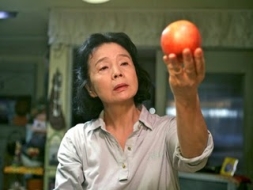|
Newest Reviews:
New Movies -
The Tunnel
V/H/S
The Tall Man
Mama Africa
Detention
Brake
Ted
Tomboy
Brownian Movement
Last Ride
[Rec]³: Genesis
Hara-Kiri: Death of a Samurai
Indie Game: The Movie
Abraham Lincoln: Vampire Hunter
Old Movies -
Touki Bouki: The Journey of the Hyena
Drums Along the Mohawk
The Chase
The Heiress
Show
People
The Strange Affair of Uncle Harry
Pitfall
Driftwood
Miracle Mile
The Great Flamarion
Dark Habits
Archives -
Recap: 2000,
2001, 2002,
2003, 2004
, 2005, 2006,
2007 , 2008
, 2009 ,
2010 , 2011 ,
2012
All reviews alphabetically
All reviews by star rating
All reviews by release year
Masterpieces
Screening Log
Links
FAQ
E-mail me
HOME
| |
Poetry (Lee Chang Dong, 2010)

Sensitive, almost to a fault, Lee Chang Dong’s Poetry
is a well-observed but minor effort from one of the top Korean filmmakers.
Centered on Mija, a woman in her sixties who discovers that she is afflicted by
the first stirrings of dementia, the film is a quiet study in repression. It
traces Mija’s struggle toward articulation of her emotions, most expressly
during scenes that show her enrolled in an adult education poetry course.
There’s little plot to be found in Poetry, but most of what is there
involves Mina’s discovery that her loutish grandson has been involved in a group
rape of a girl that culminated in her suicide. Mina’s gradual process of
identification with the dead girl becomes the movie’s emotional arc, which both
helps to clarify the director’s attitude toward her illness and helps to confirm
Poetry as yet another significant entry in the oeuvre of a director
whose work has become increasingly centered on women’s suffering.
Like Lee’s earlier Oasis and Secret Sunshine, Poetry
lives and dies by the quality of its leading actress’ performance. Yun Jung Lee,
who plays Mija, doesn’t let her director down. She anchors every scene of the
film, creating a character who is alternatively flighty, devoted, and
despairing. Her struggles to assert herself emotionally are the film’s central
concern, which gives her performance ample opportunity to shine. “The point is
the feeling,” an amateur poet tells her while describing her writing process,
and where Ms. Lee succeeds is in helping us to understand her uncertainty about
her conflicting emotions. Elsewhere, director Lee’s devotion to women can be
felt. Most of the men here are emotionally stunted louts. Even the one male who
is attempts to describe his feelings in Mina’s poetry class talks somewhat
superficially in comparison to the parade of women who rhapsodize about the
glories of childhood or love.
Much of Poetry is spent watching Mija play an amateur detective, as she
attempts to understand her grandson’s crime, or watching her scribble phrases in
her poetry notebook. This makes for a singularly quiet and observational film,
which creates mixed results. Many of the lyrical moments here (e.g. Mija’s hat
blows off her head, into the river in which the young girl threw herself) work
toward an intended, unmissable effect, diluting their impact. Mija’s few
emotional outbursts seem somewhat uncharacteristic, given the film’s ultimate
trajectory. Still, the overriding feeling of empathy that comes to dominate
Poetry grows moving by the film’s inevitable final sequence. In many
respects, this could be seen as a subtler companion piece to Bong Joon-ho’s
Mother, which examined similar issues of death and devotion. Next to the
sheer anguish displayed in Secret Sunshine, Poetry’s quiet
despair seems bit slight, but its subtlety makes it a singular experience.
58
Jeremy Heilman
07.14.11
|